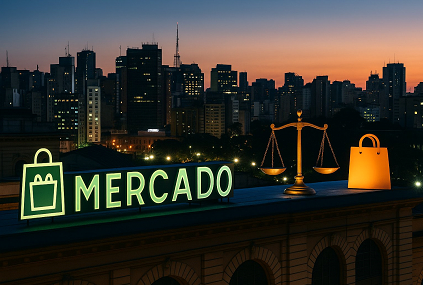Rio de Janeiro
Av. Presidente Wilson, 231 / Salão 902 Parte - Centro
CEP 20030-021 - Rio de Janeiro - RJ
+55 21 3942-1026

Brazil enforces one of Latin America's most sophisticated competition regimes, anchored by Law No. 12,529/2011. The Administrative Council for Economic Defense (CADE) oversees merger control, cartel investigations, and unilateral conduct reviews. A Brazilian antitrust lawyer navigates this regulatory landscape to secure timely clearances, design robust compliance frameworks, and defend clients against high-stakes investigations.
Brazil applies a mandatory suspensive merger-control system. Deals meeting turnover thresholds—BRL 750 million for the acquiring group and BRL 75 million for the target—must be filed before closing. CADE’s General Superintendence (SG) conducts Phase I reviews within 30 calendar days for non-complex cases. Phase II, triggered for deeper analysis, extends the review to 240 days. Counsel orchestrates economic studies, coordinates data rooms, and negotiates remedies to secure approval without derailing deal timelines.
Implementing transactions before CADE clearance constitutes gun-jumping, punishable by fines reaching BRL 60 million plus annulment of integration steps. Lawyers craft hold-separate covenants and clean-team protocols to mitigate inadvertent integration during review.
CADE pursues cartels aggressively using dawn raids, settlement talks, and leniency agreements. First-in whistleblowers may obtain complete fine immunity and criminal leniency for executives. Counsel conducts internal audits, preserves privilege, and orchestrates leniency submissions to maximize protection.
When market power is present, practices such as predatory pricing, refusal to deal, exclusivity rebates, and tying are scrutinized. Lawyers develop economic defenses proving pro-competitive justifications and efficiency gains.
Effective antitrust compliance includes policy drafting, red-flag checklists, e-learning modules, and dawn-raid preparedness. CADE rewards robust programs by mitigating fines and potentially closing probes early.
Following CADE findings, victims of anticompetitive conduct may sue for treble damages. Counsel defends actions, challenges causation, and negotiates settlements that balance financial exposure with reputational concerns.
Platform dominance, algorithmic collusion, and data-portability obligations are emerging concerns. Lawyers advise tech clients on self-assessment tools and interface transparency to preempt enforcement.
CADE coordinates with the U.S. DOJ, EU Commission, and OECD. Counsel aligns arguments across jurisdictions, leveraging global jurisprudence while addressing Brazil-specific nuances.
Fines for anticompetitive conduct can reach 20% of gross revenue in the affected market. Settlement agreements (TCCs) allow reduced penalties in exchange for commitments, training, and periodic audits.
Collect internal communications responsibly, engage economists to define the market, prepare privilege logs, and identify pro-competitive efficiencies upfront.
CADE leverages electronic discovery and forensic imaging. Counsel negotiates the scope, asserts confidentiality, and leverages data rooms to control sensitive information.
Highly regulated industries—pharmaceuticals, telecom, payment services—face dual scrutiny. Sector regulators collaborate with CADE on vertical restraints and market-structure reviews.
Oral hearings, economic memoranda, and negotiated undertakings shape Tribunal decisions. Lawyers craft concise economic narratives supported by empirical data and precedents.
Collaborations on sustainability may raise coordination concerns; counsel structures joint initiatives under legitimate cooperation frameworks.
Train reception teams, keep legal counsel on standby, and secure privileged files separately. A detailed playbook reduces disruption and preserves legal defenses.
Anonymous channels bolster early detection of collusion. Legal teams monitor complaints, investigate discreetly, and escalate when necessary.
Hypothetical monopolist tests, diversion ratios, and critical-loss analysis form the backbone of economic submissions.
Parties may appeal to federal courts on procedural grounds, though judicial deference to CADE’s technical expertise is typical.
A specialized antitrust lawyer synchronizes economic, legal, and strategic insights—shielding transactions, deterring enforcement, and sustaining competitive advantage.
Q: When is a merger filing mandatory?
A: If the combined turnover thresholds of BRL 750 million and BRL 75 million are met.
Q: How long does Phase I review take?
A: Typically 30 calendar days for non-complex cases.
Q: What is gun-jumping?
A: Implementing any competitive integration before CADE clearance.
Q: Can we close globally before Brazil?
A: No—Brazilian closing must await CADE approval regardless of foreign clearances.
Q: What benefits does leniency offer?
A: Full immunity from administrative fines and criminal prosecution for first-in applicants.
Q: Are settlement discounts negotiable?
A: Yes—discounts up to 50% for early-stage settlements are standard.
Q: How are fines calculated?
A: Up to 20% of gross revenue in the affected market during the infringement year(s).
Q: Does CADE accept behavioral remedies?
A: Yes—monitoring trustees oversee compliance with access or non-discrimination commitments.
Q: What is a TCC?
A: A cease-and-desist settlement agreement with reduced penalties and compliance obligations.
Q: Is attorney-client privilege recognized?
A: Yes, but limited to external counsel communications.
Q: Are cartels criminal in Brazil?
A: Yes—participating executives face 2 to 5-year prison sentences.
Q: How often should compliance training occur?
A: At least annually with refreshers after personnel or regulatory changes.
Q: Does CADE review minority share acquisitions?
A: Yes, if acquisition confers competitive influence and meets thresholds.
Q: What is the hypothetical monopolist test?
A: An Economic tool to define markets by assessing price-increase profitability.
Q: Can CADE challenge expired transactions?
A: Yes, within one year if thresholds are triggered and not notified.
Q: What triggers dawn raids?
A: Reasonable suspicion supported by evidence of cartel conduct.
Q: Is vertical integration scrutinized?
A: Yes, particularly when foreclosure risks arise.
Q: Do digital platforms face unique scrutiny?
A: Algorithms and network effects heighten antitrust concerns.
Q: What is the statute of limitations?
A: Five years for administrative sanctions after infringement ends.
Q: Can CADE decisions be overturned?
A: Judicial appeals are possible but rarely succeed on the merits.
For tailored legal guidance, please email: [email protected]
 Mr. Alessandro Jacob speaking about Brazilian Law on "International Bar Association" conference
Mr. Alessandro Jacob speaking about Brazilian Law on "International Bar Association" conference Av. Presidente Wilson, 231 / Salão 902 Parte - Centro
CEP 20030-021 - Rio de Janeiro - RJ
+55 21 3942-1026
Travessa Dona Paula, 13 - Higienópolis
CEP -01239-050 - São Paulo - SP
+ 55 11 3280-2197